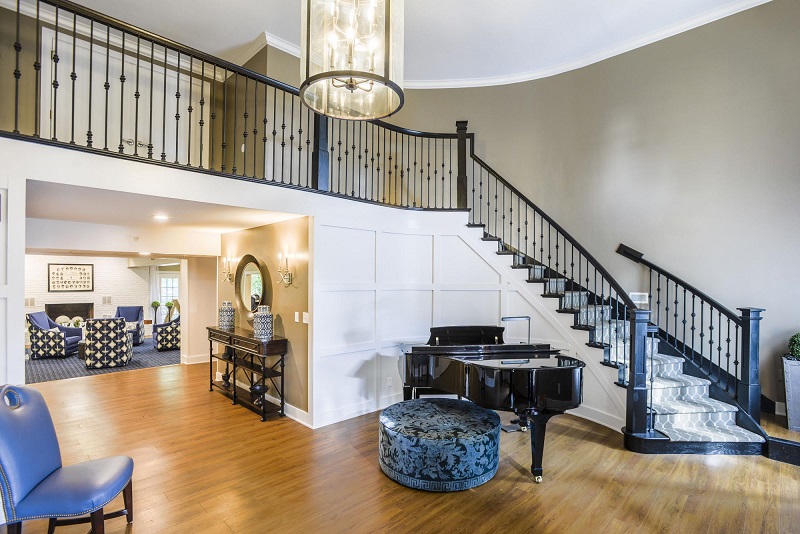It’s a problem at universities across the country: There isn’t enough on-campus housing for the students searching for it. At the same time, rents for off-campus housing continue to rise, making it difficult for students to find affordable rooms at their universities.
Officials at Butler University, a private university in Indianapolis, recognize this. And they’re taking a different approach to providing more housing for their students: They’ve asked architecture and design firm Luminaut to renovate and build new fraternity and sorority buildings across the campus, providing more housing options for a university in desperate need of additional space for its students.
Eric Rowland, principal in the Indianapolis office of Luminaut and the firm’s Greek housing expert, said that the focus on improving Greek housing options makes sense for Butler. With greater amenities and modern design, these Greek buildings will attract more students. That will relieve some of the pressure on the university to continue building new on-campus dormitories.
“There is a lot of emphasis on student housing in general today,” Rowland said. “Colleges across the country are replacing older traditional dorms with apartment-type living. The newer buildings tend to focus more heavily on amenities. That’s the case at Butler, too. Students expect better amenities in their on-campus residences. Greek housing tends to be a little denser in terms of how many students it can house. It made sense, then, to renovate these buildings to make them more attractive to students.”
Rowland said that Butler officials recognized that they didn’t have to build enough on-campus housing to accommodate 100% of the school’s student population. The Greek system can house a significant percentage of these students.
Luminaut is still active on Butler’s campus, working with sororities and fraternities as they determine when they are ready for renovations or expansions. Not all Greek houses will go through the process, but many will, when the time is right.
“The university doesn’t own the Greek houses, but Butler is encouraging the houses to consider renovations,” Rowland said. “The different houses were bult at different times and in different styles. Because of this, renovations and expansions all come with different costs. It’s up to the different Greek houses, then, to determine when or if they are ready for changes. Because of this, the work that we are doing is ongoing at Butler.”
Located on the north side of Indianapolis, Butler University has opened two new residence halls since 2016 and is renovating a third to help meet the housing needs of its students. Students here can choose from seven campus housing options and about 2,500 beds. The university also requires full-time undergraduate students to live in university-owned or -operated housing for six academic semesters — three years.
The 33% to 38% of Butler students who belong to a fraternity or sorority can live in Greek chapter housing. That’s where Luminaut comes in. Of the 14 Greek organizations on campus, Luminaut has renovated or built new houses for more than half. Butler prioritized an improvement to its Greek housing starting in the 2000s, beginning with renovations to the Delta Delta Delta house, the largest sorority on campus with the smallest house.
Luminaut worked with Tri Delta to more than double the size of the sorority’s housing. Luminaut also worked with Lambda Chi Alpha to build a new house on a site adjacent to most of the university’s other Greek houses.
After that? The university and Luminaut began a steady stream of renovation projects, all of which helped boost the number of students that could comfortably live in Butler’s Greek housing, providing relief for a campus in need of additional student housing.
Luminaut completed a master plan and renovation for Delta Gamma, and Sigma Nu again reached out to the firm, this time for the design of a completely new house. Two doors down, Phi Kappa Psi tapped the architecture and design team to find a solution for an existing chapter house that was without a dining room. A reconfiguration of the main public level created space for both a commercial kitchen and dining room.
Rowland said that Luminaut focused on the way students today entertain themselves and interact – or don’t interact – with their fellow housemates when redesigning sorority and fraternity houses.
Students today spend much of their time staring at their phones or visiting social media. Because of this, they often struggle to engage with their fellow housemates. Luminaut, then, designed spaces in which members of the Greek system would be encouraged to put down their screens and interact with their fellow students.
This meant adding study and dining spaces adjacent to the main entry points of Greek houses. Residents will have to pass by these spaces, which will often be more crowded with their fellow housemates, before they can reach their own rooms. That, Rowland says, is designed to encourage students to speak more with their housemates.
“It’s an opportunity to break some barriers,” Rowland said. “Students can start a conversation with someone whom they haven’t spoken to in a while. In these Greek buildings, there is strength in membership. It’s important for sororities and fraternities to keep men and women in their houses for a couple of years. They can increase the odds of this with interior spaces that encourage residents to become more connected with each other, to develop non-digital bonds with people.”
Another important feature of Luminaut’s designs? Front porches, spaces that also encourage socialization. Luminaut’s plans also call for open layouts of the Greek houses’ common areas, another way to use design to encourage residents to spend more time socializing and fewer hours tapping on their phones.“We’ve designed these buildings so residents won’t just slip into a back stairwell and go into their rooms,” Rowland said. “They are forced to pass through some of the public rooms in the house.”
